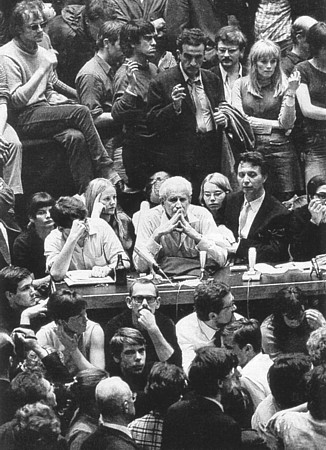 A break in the roaring silence. Fans will know that I have been busy elsewhere - jumping roundabouts and swinging on hurdles for University bureaucracy, teaching psychoanalysis to 17 year olds and laying awake at night thinking about the dissertationy things that I can't find the time to think about at any other point. The upshot of this is that new content will appear here, forthwith. Promise.
A break in the roaring silence. Fans will know that I have been busy elsewhere - jumping roundabouts and swinging on hurdles for University bureaucracy, teaching psychoanalysis to 17 year olds and laying awake at night thinking about the dissertationy things that I can't find the time to think about at any other point. The upshot of this is that new content will appear here, forthwith. Promise.Nevertheless, the reason for this break in the static is to give later-than-late notice of a symposium at the University of Melbourne tomorrow. It takes on/up/over/aim at the topic of May '68. I paste below the official circular sent to me late today. (Breaking news!) I had thought of preparing a presentation on the (overwhelming) tinges of nostalgia in the remembrance of May '68. As it was, time got the better of me, and the topic seemed a fair stretch from my Easterly homepatch. Much too occidental a concern for me to dally with.
All are welcome to listen to the papers, and enjoy the provocation and opportunity to talk about revolting students!(Pic via marcuse.org)
The order of speakers is not yet confirmed, so if you wish to disregard the rest of us and only come to hear your favourite, I am afraid you will have to await a further update, or contact your pet directly.
Following the program is the general outline of the nature and intentions of the symposium.
Provocations of '68
A Social Theory Postgraduate Symposium
Friday 15th August
Multi-function Room, 1888 Building
The University of Melbourne
10am – 4pm
Welcome
9:30 - 10:00 am
Coffee and Tea in the Multifunction Room
Foreword
Assoc/Prof. John Rundell - 1968 and Social Theory
Session 1
10 – 12:00 am
Bryan Cooke - Cassius at the Carnival, or How much light does it take to be invisible?
Yoni Molad - The concept of the Situation in Guy Debord's 'Society of the Spectacle'
Thea Potter - Les Cadres: from Revolution to Evolution
Sergio Mariscal - On Other '68s: Prague, Berlin and Mexico City
Session 2
1:00 – 2:30 pm
Stefan Siemsen - Intellectual Labour - Then and Now
James Field - Beyond the Barricades
Michael Ashcroft - Althusser and 1968
Afternoon Tea
2:30 – 3:00 pm
Roundtable discussion
3:00 – 4:00 pm
Moderated by Dr. John Cash
Afterword
Professor Ghassan Hage - Closing Remarks: The Meanings of 1968
Abstract/invitation/summary/prelude/outline/intentions
May ’68 stands as a loadstone to the imagination. With forty years hindsight interpretations of the significance of the events, the demands, the causes and consequences continue to provoke debate and the taking up of positions not only on the past but also on our current situation. Beyond the question of what ’68 was, taking a standpoint on ’68 entails the engagement with the content of ideology, practice and social change and its continuity or discontinuity with the present.
The events of ’68 were formative for a generation of French intellectuals that have become canonical. The responses of theorists and philosophers who observed and participated in the events of ‘68 acted (and still act) as a litmus test of their political positions. But ‘68 should not be seen only as a battle of intellectuals, particularly since the events were perhaps unprecedented to many of the thinkers that we associate with that time, challenging and provoking them to rethink positions towards both capitalist and socialist modernity.
And the social action of ’68 was not confined only to France or to a student uprising. In the Americas as much as in Europe movements contested the legitimacy of social life, of domination political and economic, of the ubiquity of state violence and the one dimensionality of work.
The intention of this symposium is to gather together for a day of presentations and discussion on the social, cultural and philosophical legacy of May ’68, to examine the debates around what happened, but also what was demanded, what were the causes, and what is the legacy of a failed revolution or a cultural watershed or a social movement.
1 comment:
Excellent, excellent! Looking forward to the new material...
Post a Comment